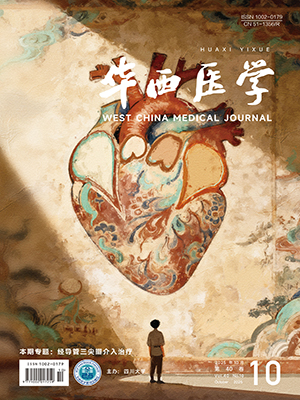| 1. |
袁士杰, 史征, 杨俊驰, 等. 双通道重建手术与全胃切除术对胃癌患者术后营养状况的影响. 第二军医大学学报, 2020, 41(1): 32-36.
|
| 2. |
英圣艳, 路潜, 任晖, 等. 胃癌根治术患者饮食及营养状况的调查. 护理管理杂志, 2013, 13(8): 549-551.
|
| 3. |
苏甜. 胃癌患者术后膳食营养知信行调查研究. 石家庄: 河北医科大学, 2018.
|
| 4. |
成洋, 贺娟, 周小莉. 早期精细化护理干预联合序贯式营养治疗对脑卒中后吞咽功能障碍患者的疗效观察. 中国医刊, 2024, 59(7): 741-745.
|
| 5. |
蒋萍萍, 耿美玉, 李瑞. 基于营养风险筛查的序贯式营养干预对老年髋部骨折手术病人的影响. 循证护理, 2024, 10(6): 1122-1125.
|
| 6. |
谢亚敏. 营养替代疗法对胃癌患者术后化疗期间营养状态和生活质量的影响. 重庆医学, 2021, 50(1): 32-64.
|
| 7. |
宋青龙, 靳和平. 序贯性早期肠内营养与康复锻炼对胃癌患者术后营养状况的影响及安全性. 青岛医药卫生, 2024, 56(4): 290-293.
|
| 8. |
盛英丽, 张春丽. 品管圈活动在提升面瘫住院病人健康宣教内容执行率中的应用效果. 护理研究, 2023, 37(6): 1117-1120.
|
| 9. |
Liu Y, Lin B. Application of quality control circle in the treatment of moderate cancer pain in inpatients. Jpn J Clin Oncol, 2020, 50(5): 581-585.
|
| 10. |
中华医学会肿瘤学分会, 中华医学会杂志社. 中华医学会胃癌临床诊疗指南(2021 版). 中华医学杂志, 2022, 102(16): 1169-1189.
|
| 11. |
游利江, 葛杰, 刘婷, 等. NRS 2002 和 PG-SGA 在胃肠道恶性肿瘤患者中的应用. 胃肠病学, 2023, 28(7): 432-436.
|
| 12. |
Xu YC, Vincent JI. Clinical measurement properties of malnutrition assessment tools for use with patients in hospitals: a systematic review. Nutr J, 2020, 19(1): 106.
|
| 13. |
石军梅, 王晓翔, 刘英, 等. EORTC QLQ-C30 量表应用于胃癌术后化疗患者的信效度检验. 河北医科大学学报, 2015, 36(4): 448-451.
|
| 14. |
高加蓉, 陈锦, 柏杨. 品管圈在提升研究型医院品质中的运用与实践探索. 中国医院管理, 2016, 36(12): 90-91.
|
| 15. |
姬倞. 胃癌术后患者居家营养管理方案的构建. 湖州: 湖州师范学院, 2022.
|
| 16. |
何栋, 樊万里, 张树泽, 等. 肌肉减少症与胃癌的相关研究. 华西医学, 2023, 38(7): 1091-1095.
|
| 17. |
费超男, 段培蓓, 杨玲, 等. 胃癌患者围手术期营养管理的最佳证据总结. 中华护理杂志, 2022, 57(19): 2345-2352.
|
| 18. |
陈博, 熊茂明, 孟翔凌. 临床营养支持在围手术期患者中的应用. 华西医学, 2017, 32(8): 1303-1307.
|
| 19. |
李政焰, 赵永亮, 钱锋, 等. 机器人远端胃癌根治术后并发症的 Clavien-Dindo 分级及危险因素分析. 腹腔镜外科杂志, 2020, 25(1): 15-20.
|
| 20. |
颜廷启, 王清馨, 刘博, 等. 胃癌术后早期应用免疫增强型肠内营养制剂联合肠外营养的疗效分析. 现代消化及介入诊疗, 2020, 25(9): 1224-1227.
|
| 21. |
崔小丽, 宋春蒙. 肠内肠外营养支持序贯对重症患者营养状况、炎症因子及并发症的影响. 牡丹江医学院学报, 2021, 42(4): 116-119.
|
| 22. |
肖霞, 李中福, 郭轶, 等. 经鼻-空肠肠内营养对胃癌根治术后患者营养状况、炎症反应及并发症的影响. 贵州医科大学学报, 2021, 46(10): 1226-1230.
|
| 23. |
周玲, 汪欢, 邹莞. 营养序贯护理模式对行胃癌根治术患者营养状况及术后并发症的影响. 中西医结合护理(中英文), 2022, 8(4): 121-123.
|
| 24. |
周雪玲, 蔡蕾, 粟静. 胃癌根治术后早期序贯肠内营养支持与全肠外营养的随机对照研究. 中国实用医药, 2017, 12(16): 106-107.
|
| 25. |
迟俊涛. 消化道肿瘤患者围手术期营养不良对临床结局的影响研究. 北京: 中国协和医科大学, 2010.
|




